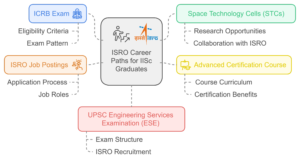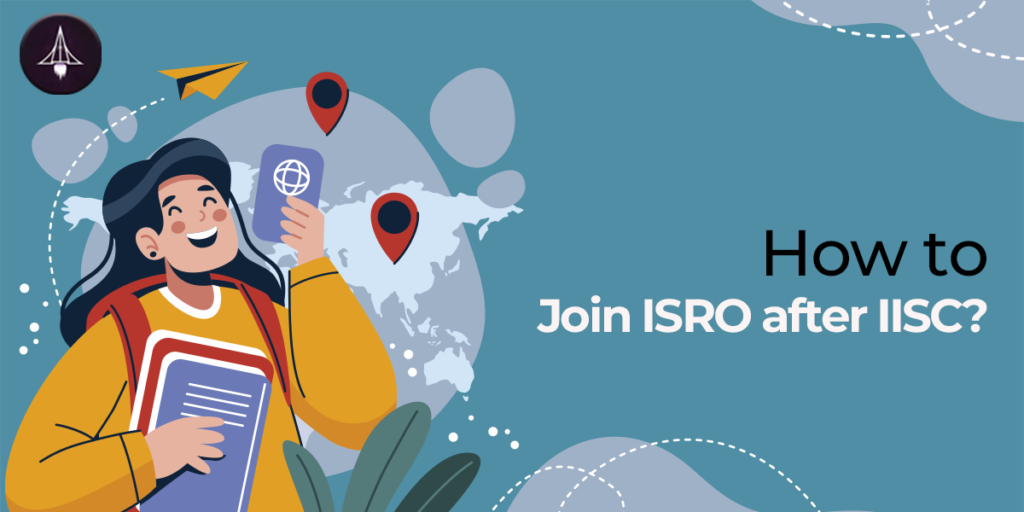Joining ISRO after IISc can be a rewarding career path in space science and technology. With options like ISRO’s recruitment exams, direct interviews for highly qualified researchers, or collaborations through IISc projects, you can apply your skills to real-world space missions.
In this Blog we are going to cover the pathways to enter IISER after graduating from IISc and how to enhance your profile for proving yourself a best fit.
Primary Pathways to Join ISRO After IISc?

IISc graduates can join ISRO primarily through the ICRB exam. Other options include working in Space Technology Cells (STCs), completing the Advanced Certification Course in Space Technologies at IISc, applying through ISRO’s job postings, or taking the UPSC Engineering Services Examination (ESE).
ISRO Centralized Recruitment Board (ICRB) Exam:
The ICRB exam is the main path to directly join ISRO as a scientist or engineer. Here are the key things you need to keep in mind:
- You must have a bachelor’s degree in engineering or science and be under 35 years of age.
- Applications typically open in May each year.
- The exam is usually held in July.
- The duration of the exam is 90 minutes with 80 multiple-choice questions. The questions cover technical subjects and general knowledge.
- Successful candidates are shortlisted based on exam performance and called for an interview.
The ICRB exam is highly competitive, so it’s essential to prepare well to secure your dream career at ISRO.
Research Opportunities through Space Technology Cells (STCs):

Space Technology Cells (STCs) are special research centers established by ISRO at top institutes like IISc and select IITs to promote space research and innovation. These cells support projects directly aligned with ISRO’s mission, providing students with hands-on experience in critical space technology areas.
- STCs focus on advanced research areas such as satellite technology, propulsion, remote sensing, and materials science. Projects are chosen and overseen by Joint Policy Committees (JPCs), which include members from ISRO and the institute’s faculty.
- The STC at IISc enables students and researchers to work on projects that directly support ISRO’s goals. Students gain exposure to real-world challenges in space science, enhancing their skills and connecting them with ISRO’s network.
- Participating in STC projects can strengthen your profile for a future role at ISRO. The experience is highly relevant and often provides opportunities to collaborate with ISRO scientists and engineers.
The STC pathway is ideal for those passionate about research and looking to contribute directly to space technology advancements in India.
Advanced Certification Course in Space Technologies:

The Advanced Certification Course in Space Technologies at IISc is a specialized program designed to equip students with in-depth knowledge and skills in space science and technology. Here’s what to know:
- This course covers key areas of space technologies, including satellite systems, space propulsion, remote sensing, and space exploration techniques. It’s aimed at students who want to deepen their technical expertise in areas relevant to ISRO and the space industry.
- The program fee is ₹2,16,000, with an additional ₹2,000 application fee.
- Completing this certification enhances your qualifications for roles at ISRO, as it provides hands-on experience and targeted knowledge in space technology fields.
This course is an excellent option for IISc graduates looking to strengthen their application for ISRO and similar organizations focused on space research and innovation.
Enhancing Your Profile for ISRO:
To improve your chances of joining ISRO, building a strong, relevant profile is essential. Here are some key areas to focus on:
- Participate in projects related to space technology at IISc, especially through Space Technology Cells (STCs). Working on ISRO-supported research can strengthen your technical skills and showcase your interest in space science.
- ISRO values technical expertise in areas like programming, data analysis, simulation, and problem-solving. Focus on building skills that align with ISRO’s needs, such as proficiency in MATLAB, Python, CAD tools, and other technical software.
- Attend seminars, workshops, and conferences where ISRO scientists are present. Building connections can provide insights into ISRO’s work culture and may open doors to future opportunities.
- Regularly check ISRO’s website for job postings and recruitment news. Applying promptly when roles open shows enthusiasm and helps you stay ahead.
Focusing on these steps will help strengthen your profile, making you a more competitive candidate for a career at ISRO.
Conclusion:
Joining ISRO after IISc is a rewarding path that lets you contribute to India’s space exploration and technology. With multiple pathways – from the ICRB exam to research projects and certifications – there’s a clear route for every aspiring scientist or engineer. Focus on building relevant skills, gaining hands-on experience, and staying connected with ISRO’s work.
Remember, the journey to ISRO requires dedication and preparation, but the impact you’ll make on India’s space mission is well worth it. Keep pushing forward, stay curious, and embrace the challenge – ISRO awaits those ready to reach for the stars.
Check out this blog if you wanna know about further opportunities after IISc.
FAQs:
- What is the main exam to join ISRO after IISc?
The primary exam is the ISRO Centralized Recruitment Board (ICRB) exam, which directly recruits engineers and scientists for ISRO. - Can I join ISRO through research at IISc?
Yes! By working in Space Technology Cells (STCs) at IISc, you can gain research experience on ISRO projects, which strengthens your profile for ISRO roles. - Is there a course at IISc to improve my chances of joining ISRO?
Yes, IISc offers the Advanced Certification Course in Space Technologies, which provides in-depth training in space-related fields and adds to your ISRO qualifications. - How else can I apply to ISRO if I miss the ICRB exam?
You can apply for ISRO roles through job postings on ISRO’s official website and UPSC’s Engineering Services Examination (ESE) for specific engineering roles.
About Us:
SciAstra is a team of scientists and research scholars from the top research institutes around the world, like Oxford, Harvard, Cambridge, and so on. Our vision is to promote critical thinking and scientific temperament by helping students pursue careers in science.
We offer many free and paid courses where our mentors from the top research institutes like IISER, NISER, IACS, CMI, ISI, IISC Bangalore, etc., teach students in live classes, with study materials, mock tests, books, and everything needed. We have taught more than 10,000 students already since 2021 and achieved over 1000 selections with AIR 1, 7,10, 12, and 13 in IISc Bengaluru, IISERs, NISER, IACS, and so on. If you are looking to prepare for IAT / NEST 2025, you can check out our courses and get access to live classes, recorded lectures, study material, mock tests, doubt-clearing classes, and much more!
To know more about us, click here OR download the SciAstra App from the Play Store and App Store!





